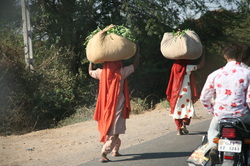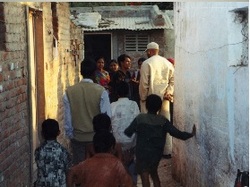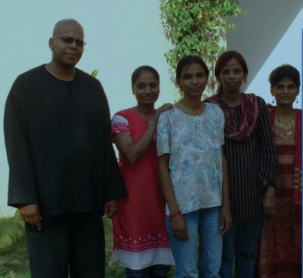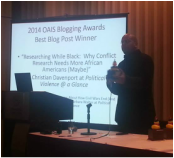
I wish to free the rural women of India and take them to the Indian version of Amazonia – a world occupied by women, for women, of women. The reason is simple: they are locked down beyond belief. From birth they are seemingly prepared for marriage. They work, then work some more, then work again without adequate compensation. They do everything inhumanly imaginable, in flip flops and a sari (not an apology, which I will offer them now but a flimsy piece of fabric that stretches beyond belief).
Any man appears to have more rights than they do – frequently able to exert them directly. There is no divorce without major stigma; no jobs and no apartments for the husbandless.
What is the key or, rather, one of the keys to their freedom? Well... African American women. As I came across different situations and heard different stories, at different points I kept thinking about different relatives as something of a mental experiment. None of the schemes worked completely but it did provide some insights, albeit for a minute.
Option 1 – The Freedom Ride (from my Aunt Pat who often served as a delivery truck for the family taking anyone and anything to anybody):
The freedom ride would be a black bus with a huge flag held at 15-20 feet high so that it could be seen from a distance;
There would be no doors and the windows would be blackened;
It would always drive at the same speed to facilitate getting on or off;
There would be no questions – any woman could just step on it and be brought to Indiamazonia
Problems:
How would folks find out? Word of mouth wouldn’t work because if men found out they would either take out the bus or follow the bus and extract their property.
One could send a witch into a village who threatens all the men. After they leave there could be a meeting to tell the women what is up. This is problematic as well because one informant takes down the whole idea.
Option 2 – Witchin Woman (My Aunt Annabelle – the closest to our geechee roots in south Carolina who with her multi-colored wigs, babble-speak, tribal markings otherwise known as makeup and individualized incantations to deliver death to ex-husbands, liquor by the bottle and magic numbers put fear into all of us)
This solution was simple: use witches to threaten abusive men, identified by women to local stringers at the well.
Problem:
It is not clear how new witches are brought into communities. They all appear to be locally-developed and thus the only solution would be to turn them to the cause.
Option 3 – Micro-Mace (One of my aunt's on Mother’s side who gave out advice, weapons and training to all women in the family).
Similar to giving poor people access to credit, I thought that there could be some allocation of mace given to women at watering holes so that they could protect themselves
Problem:
Men might get a hold of them and use them on the women and each other
Option 4 – The Woman’s Protection Program (This one was inspired by Nana – my mother’s mother, who would take in anyone for a while and would lie left and right to keep them protected while in her care).
Essentially this would be an organization whose job it would be to extract oppressed women, relocate them to a new locale (like a city) and create a back-story that explained their legitimate departure. They would provide a new identity card, new family history and a new village complete with a false history to provide cover.
Problem:
Almost regardless of location, single women are stigmatized and thus it is unclear if any legitimate excuse could be found. An alternative would be to pair them with men who seek to escape oppression, creating a back story as well as separate living quarters for the couple.
There has gotta be a better way.




 RSS Feed
RSS Feed
